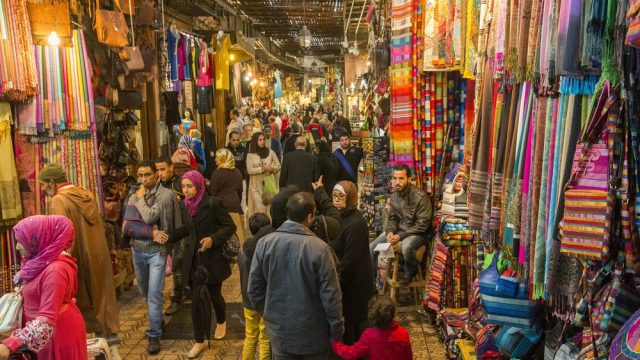Moroccan souks are colorful, chaotic, and can be exhausting. They are a beautiful blur of sounds and sights including carpets, kelims, colored scarves, brassware, Berber jewelry, lamps, ceramics, wooden chess sets, elaborate crafted wooden bowls, djellabas (robes), and food items like sticky halwa, pastries, and spices, among many other things. With such a variety of goods on display you will probably have a “must have “ moment when you really want to buy something — and thus begins the haggling.
You mustn’t show how keen you are on the thing you really want, and you would do well to ask the price of another item and then work up to bargaining over what you really want. The standard advice is to offer half the price which has been asked. The store holder will then come back with a counter offer, and you will either accept or keep seeking a lower price. Obviously the circumstances will vary according to whether you are in a carpet shop with dozens of carpets being thrown down in front of you, or in a small store with an inexperienced young salesman. You have to be prepared to be firm and if necessary walk away. “La shukran” (“no thank you”) is a useful phrase. So is “wakha,” which means OK and “inshallah,” which means “God willing.” If you speak some French and have a few words in Darija, the local dialect, this will help, although English is now far more common than it used to be.
Some people delight in haggling and have a real talent for it, but many from a Western environment do not, and are used to paying the price demanded. (In fact some shops have fixed prices, because they realize that they are more likely to make a sale to a Westerner this way.) Not every sale is accompanied by aggressive salesmanship, but many are. It’s a shame that young salesmen are not always well trained in how to sell effectively. It is also annoying when a tourist looks in a shop window and begins to admire the jewelry pieces, only to be distracted by the shopkeeper. If the tourist was given time to look at his leisure, he would probably talk himself into buying –instead he is sometimes turned away by a needless torrent of words. This is particularly true of some areas in the souks of Marrakech. Souks in Essaouira and Fez are a more relaxed and less pressurized experience.
Here are some more general tips for haggling, plus some advice specific to Marrakech:
- Don’t rush yourself. If you have a few days, just wander around the souks, see what’s there, and compare prices. Aside from shopping, the souks themselves are a glorious spectacle unto themselves — especially the Souk Semmarine, the main entrance to the souks in Marrakech. For the first two visits just stroll around and take in the sights. Select items and go back the next day for the haggling. Don’t buy when you are with a guide, as this will increase the price (because guides can claim a commission).
- Read up before you arrive. This is particularly important for specialized products like carpets. You need to have some idea about the different types of carpet whether urban or rural, Arab or Berber from the Atlas mountains, etc. You really need expert advice when bargaining over high quality carpets. The best short introduction to Moroccan carpets can be found on The View From Fez website. You can also find good carpet deals in souks like Amizmiz and other towns outside Marrakech, and in cities like Meknes, Essaouira and Rabat (if you have the time to travel).
- Visit the local Ensemble Artisanal if you’re timid. Run by a local cooperative, Ensemble Artisanal has fixed prices and is hassle-free. You can gauge prices for different items. Located on Avenue Mohammed V in Marrakech, opposite the Cyber Park. it is an oasis of calm and has an open air café. In addition to items such as carpets, leather, lamps, clothing and wood work, it has a leather shop which sells intricate boxes and book covers. Nothing else like it exists in the souk. You can also buy colorful naïve paintings.
- If you’re looking for jewelry, try “Aladdin’s caves.” These huge collections have many different products which can be bought without the turmoil of the souk surrounding you. L’Art des Fibule in Fez, for example has one of the best collection of quality jewelry, daggers and bronze (43 Sidi Mousa, Fez medina).

